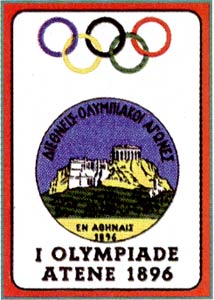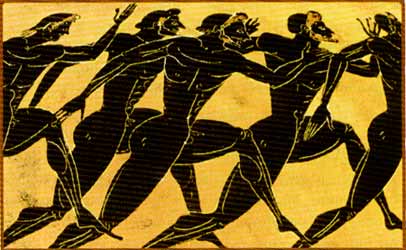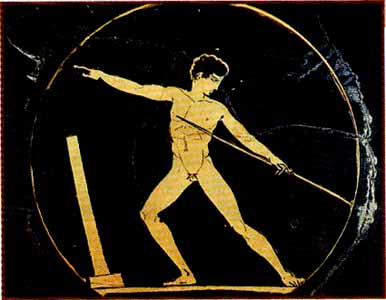Olympic Games History
Modern & Ancient
- Games in Modern Greece -
- Torches -

Olympic torch designs from Berlin (1836) to Athens (2004)
The
Athens Hash House Harriers
Olympic Games History
Modern & Ancient
- Games in Modern Greece -
- Torches -

Olympic torch designs from Berlin (1836) to Athens (2004)

Olympic torch being carried along the Great Wall of China (near Beijing) in
June 2004
(It had first come from Tokyo Japan then Seoul, South Korea)
- Logos and Posters -


1896 - Athens - Greece - The first modern Olympic Games

1900 - Paris - France

1904 - Saint Louis - USA

1908 - London - England

1912 - Stockholm - Sweden

1920 - Anvers - Belgium

1924 - Paris - France


1928 - Amsterdam - Holland

1932 - Los Angeles - USA

1936 - Berlin - Germany

1948 - London - England

1952 - Helsinki - Finland


1956 - Melbourne - Australia

1960 - Rome - Italy

1964 - Tokyo - Japan

1968 - Mexico

1972 - Munich - West Germany

1976 - Montreal - Canada

1980 - Moscow - USSR

1984 - Los Angeles - USA

1988 - Seoul - South Korea


1992 - Barcelona - Spain

1996 - Atlanta - USA

2000 - Sidney - Australia



2004 - Athens - Greece
- Games
in Ancient Greece -

Digital image reconstruction of the stadium entrance in Ancient Olympia

Ancient Greek vase
These were frequently used to depict scenes of athletic events...as below:

Olympic runners
(Note that they ran naked)

An Olympic winner leaves with his prize

Javelin thrower

Wrestlers - scene of submission

Women runners

Scene from a boxing match. The contestant's nose is dripping with blood.

4- horse chariot race

Winners of a 4-horse chariot race
HISTORY-
ATHLETES:
Originally the Games were held in honour of Zeus because he was thought to bestow
on athletes the power and prowess that enabled them to excel at sport. They
made offerings before they competed and they promised thanksgiving should they
win. It was coming first that mattered - the names of those coming in second
and third were not kept for the record. The only prize at the Olympics was an
olive wreath from the sacred tree at Olympia. But the victors were given a triumphant
return to their cities & enjoyed substantial privileges in their home states,
such as free board and tickets to cultural events for life. The athletes had
to be men of some means, as training periods at Elis, the city that controlled
the Games, lasted between one and ten months. The men would thus have to leave
their livelihood for a protracted period - although the Games were held in August
when one could leave working the land once the harvest was in. The Greeks competed
nude, because they were very proud of the way they trained and honed their bodies.
They trained for years to achieve the perfect physique, and they competed naked
to show off what they had achieved. It was regarded as barbarous or foreign
to compete in any athletic activity wearing clothes. In some cases, states would
sponsor an athlete to attend, fund their training and sometimes pay for the
votive statue victors could erect (which could cost more than a year's wages).
In Athens, Solon decreed that victors would receive the hefty sum of 500 drachmas.
- Another Mad Dog special section -
(Acknowledgement to various Greek publications)